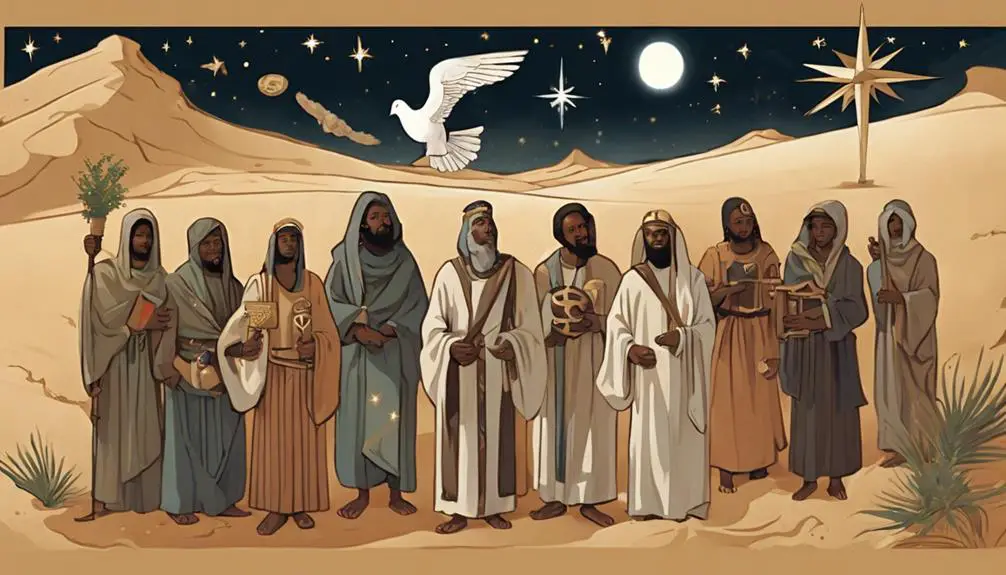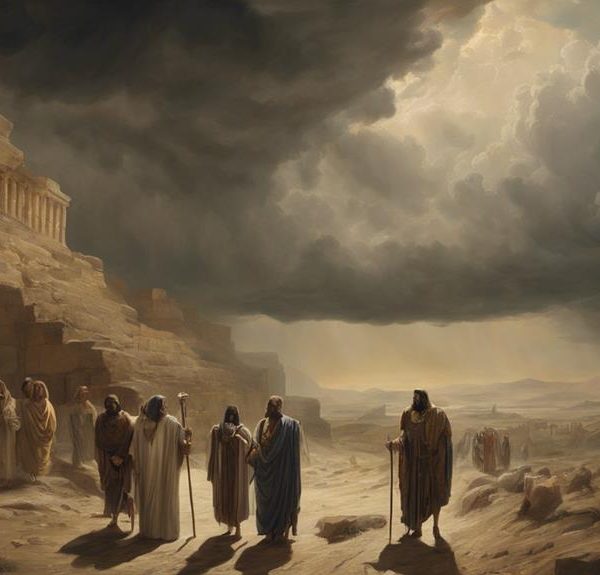Gaze into profound biblical examples of witnessing, unlocking a deeper understanding of your spiritual journey.

Examples of Witnessing in the Bible
Have you ever considered the depths of witnessing within the Bible, from the prophets' foresight to the apostles' firsthand experiences? As you explore the profound examples of witnessing, you'll uncover Elijah's prophetic vision, Moses' divine encounters, Apostle Paul's relentless advocacy, the disciples' accounts of miracles, and even personal stories like the Samaritan woman's experience.
Each narrative invites you to consider the nature of witnessing in a new light. So, what does it mean to truly witness, and why does it matter in your spiritual journey? With each page turned, you'll find yourself closer to the answer.
Key Takeaways
- Elijah's ministry exemplifies effective witnessing through courage, faith, and guidance towards righteousness.
- Moses' Burning Bush Encounter showcases how divine encounters can transform lives and alter history.
- Paul's conversion and missionary journeys demonstrate the power of personal transformation and spreading God's Word.
- Witnessing miracles, as seen in the disciples' accounts, reinforces understanding of God's power and the significance of His Word.
Witnessing Through Prophecy: Elijah

Delving into the realm of biblical prophecy, one remarkable instance of witnessing is embodied by Elijah, whose prophetic ministry in the northern kingdom of Israel serves as a beacon of divine truth and justice. You'll find that Elijah's legacy is marked by prophetic courage, a trait that sets him apart even among the revered prophets of the Bible.
Elijah's boldness in confronting the corrupt practices of King Ahab and Queen Jezebel demonstrates his unwavering commitment to uphold God's commandments. He didn't hesitate to challenge the royal authority, even when it meant risking his own life. This prophetic courage, fueled by his unwavering faith, is a key facet of Elijah's legacy.
Moreover, Elijah's prophetic revelations served as a guide for Israel during tumultuous times. His prophecies weren't just warnings but also offered a pathway towards repentance and reconciliation with God. His role wasn't merely to condemn but also to guide and heal.
In essence, Elijah's ministry encapsulates the core characteristics of effective witnessing – courage in the face of opposition, steadfast faith in God's sovereignty, and a commitment to guide others towards righteousness. His legacy, hence, provides you with a blueprint for witnessing that remains relevant to this day.
Divine Encounters: Moses' Experience

Shifting our gaze from the prophetic courage of Elijah, we now turn to explore the profound divine encounters of Moses, another monumental figure in biblical witnessing. One of the most pivotal events was the Burning Bush Encounter where Moses received his divine calling from God. This encounter not only served as a turning point for Moses but also marked the beginning of a new chapter for the Israelites, showcasing Moses' Leadership.
Event |
Significance |
|---|---|
Burning Bush Encounter |
Moses' divine calling |
Moses' Leadership |
Liberation of the Israelites |
Moses' leadership, characterized by humility and obedience, was key in guiding the Israelites out of Egypt. Despite his initial hesitation, Moses' encounter with the Burning Bush made him realize that God's power and guidance were far greater than his weaknesses. This divine encounter was a testament to Moses' faith, obedience, and courage, traits that helped him lead a nation.
In essence, Moses' experience showcases the transformative power of divine encounters in witnessing. Such experiences not only shape the person encountering them but also have significant implications for the wider community. It's a powerful reminder of how divine encounters can dramatically alter the course of history.
Spreading God's Word: Apostle Paul

In examining the biblical journey of Apostle Paul, you'll find a compelling narrative of transformation, faithful witnessing, and tireless dissemination of God's Word. Paul's conversion, a dramatic event on the road to Damascus, marks a significant turning point in his life. Originally a fervent persecutor of Christians, he metamorphosed into one of the most influential evangelists in Christian history.
His conversion, however, wasn't merely an isolated incident of personal transformation. It marked the inception of a series of missionary journeys, where he carried God's Word far and wide. These journeys, often fraught with peril, epitomize Paul's unwavering commitment to spreading the Gospel.
In his missionary journeys, Paul displayed an impressive blend of courage, resilience, and strategic acumen. He navigated diverse cultural landscapes, engaging both Jews and Gentiles alike, and established several churches across Asia Minor and Europe. His letters, many of which form part of the New Testament, provide a powerful testament to his relentless pursuit of spreading God's Word.
This account of Apostle Paul underscores the power of personal transformation, the importance of faithful witnessing, and the impact of tireless dissemination of God's message. It's a quintessential example of spreading God's Word in the Bible.
Witnessing Miracles: The Disciples' Accounts

Turning our focus to the disciples, their firsthand accounts of witnessing miracles offer a profound insight into the divine works of Jesus, further reinforcing the power and significance of God's Word. The miraculous impacts they experienced in the presence of Jesus shaped their faith, beliefs, and actions, thus altering the disciple dynamics permanently.
Walking closely with Jesus, the disciples witnessed His power over nature, illness, and even death, as seen in the miracles of calming the storm, healing the sick and raising Lazarus from the dead. These experiences weren't just awe-inspiring but transformative, challenging their understanding of reality and reshaping their worldview.
The disciples' accounts serve as valuable historical testimonies, capturing the essence of the miraculous impacts they experienced. Their narratives reveal an intricate balance of faith and doubt, fear and courage, highlighting the genuine human response to the divine.
Personal Witnessing: The Samaritan Woman

Consider the encounter of the Samaritan woman at the well, a profound example of personal witnessing in the Bible. This narrative breaks down cultural barriers and illustrates a transformational encounter with Jesus.
As you delve deeper, you'll see how Jesus' interaction with the woman transcended societal norms. Samaritans were marginalized, and women were considered inferior in that era. Yet, Jesus chose a Samaritan woman for a divine encounter, dismantling pre-existing cultural barriers.
At the well, the woman met Jesus, unaware of His identity. In their conversation, Jesus revealed her past and offered her 'living water', a metaphor for salvation. She was astounded by His knowledge and convinced of His divinity. This encounter transformed her life. From being an outcast, she became a witness of Christ's power and love.
She didn't keep this transformational encounter to herself. Instead, she shared her experience with others, leading many Samaritans to believe in Jesus. Her personal witnessing had a profound impact on her community, demonstrating the power of a personal testimony.
In essence, the Samaritan woman's encounter illustrates that personal witnessing isn't confined by cultural barriers. It can lead to transformative experiences, compelling individuals to share Christ's message.
Frequently Asked Questions
What Is the Significance of Witnessing in Christianity?
Witnessing holds significant weight in Christianity. It's a powerful tool that broadcasts the faith, impacts lives, and fosters spiritual growth.
Your understanding of biblical interpretations can deepen, allowing you to connect more intimately with God's word. By sharing your personal experiences, you're not just spreading the Gospel; you're also encouraging others, sparking curiosity about the faith, and even helping yourself in your spiritual journey.
How Does Witnessing Relate to Evangelism?
In evangelism, you use witnessing techniques to share your faith. Witnessing is a key strategy to spread Christianity's message. It's not just about telling your story, but showing how faith impacts your life.
The witnessing impact can be profound, sparking curiosity and opening doors for spiritual conversations. Remember, it's not about forcing beliefs, but sharing experiences and the transformative power of faith in a respectful, genuine way.
Are There Examples of Witnessing in Other Religious Texts Outside of the Bible?
Yes, there are examples of witnessing in other religious texts outside of the Bible. In terms of interfaith witnessing, you'll find instances in the Buddhist scriptures.
Specifically, in Buddhism, witnessing often pertains to the enlightenment experience, where individuals witness their own inherent Buddha-nature. It's a deeply personal, transformative experience that's shared to inspire others towards their own spiritual enlightenment.
How Has the Concept of Witnessing Evolved in Modern Christianity?
In modern Christianity, the concept of witnessing has evolved significantly. You'll find diverse witnessing techniques being adopted, from personal testimonies to social media evangelism.
However, these advancements don't come without challenges. It's often difficult to balance respect for individual beliefs while sharing your own faith fervently.
Still, witnessing remains a key component of Christian life, adapting to the changing times while remaining rooted in its purpose.
What Are Some Common Misconceptions About Witnessing in the Bible?
You might believe witnessing in the Bible is solely about preaching God's word. This is a common misunderstanding. Biblical interpretations often reveal witnessing as living in a way that reflects God's love and teachings.
It's not just about proselytizing, it's about embodying spiritual principles in your daily actions. Misconceptions can arise when the complex, multi-faceted nature of biblical witnessing is simplified to a single act.
Conclusion
In conclusion, you've explored various forms of witnessing in the Bible. Whether through prophecy like Elijah, divine encounters like Moses, spreading God's word like Apostle Paul, witnessing miracles like the disciples, or personal witnessing like the Samaritan woman, each instance offers a profound testament to faith.
These examples not only illuminate the power of witnessing but also invite you to reflect upon the ways you can be a witness in your spiritual journey.



Sign up